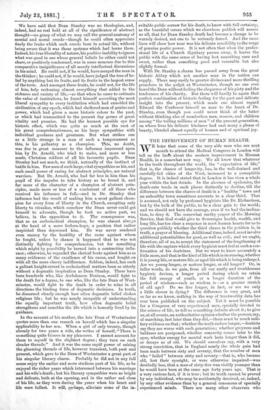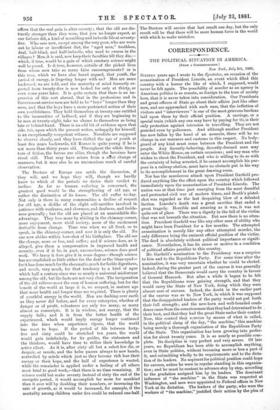THE IMPROVEMENT OF HUMAN HEALTH.
WE hope that some of the very able men who are next month to attend the Medical Congress in London will tell us the fact about the modern improvement in Human Health, in a somewhat new way. We all know that whatever be the truth throughout the world, the "expectation of life," that is, the chance of longevity, has, in the well-drained and carefully-fed cities of the West, increased to a perceptible degree. It is indeed stated that in London it has risen a whole year within the last decade. In the absence of epidemics, the death-rate tends in such places distinctly to decline, till the difference between the chance of death in a " healthy " town and an unhealthy town sometimes amounts to a clear third. That is assumed, not only by professed hygieists like Dr. Richardson, but by the bulk of the public, to be a clear gain to the world; and we should not have the courage, even if we had the inclina- tion, to deny it. The somewhat earthy prayer of the Morning Service, that God would give to Sovereigns health, wealth, and long life, has too clear a response in most human hearts for us to question publicly whether the third clause in the petition is, in truth, a prayer of blessing. Additional time, indeed, must involve additional potentialities for good, as well as evil; and we ought, therefore, all of us, to accept the statement of the lengthening of life with the rapture which every hygieist must feel at such a con- firmation of his doctrines. But we want to know accurately a little more, and that is the kind of life which is increasing, whether it is young life, or mature life, or aged life which is being enlarged. Are we young longer, or mature longer, or old longer? Or, in fuller words, do we gain, from all our costly and troublesome hygienic devices, a longer period during which we retain the full energy of youth, or a longer duration of the period of wisdom—such as wisdom is—or a greater stretch of old age? Do we live longer, in fact, or are we only a little slower in dying? The difference is very great, and so far as we know, nothing in the way of trustworthy data has ever been published on the subject. Yet it must be possible for a Congress of very experienced men, specially devoted to the science of life, to tell us something definite about it; to give us, at all events, an authoritative opinion whether the powers, say, of marching, last later than they did,—there must be much mili- tary evidence on that; whether the teeth endure longer,—dentists say they are worse with each generation; whether greyness and. baldness are postponed, whether concavity comes later to the eyes, whether energy for mental work lasts longer than it did, or decays as of old. We should ourselves say, with a very strong conviction, that in England nearly the whole gain had been made between sixty and seventy, that the number of men who "failed" between sixty and seventy—that is, who became old, lost their eyesight, or were otherwise impaired—was decidedly less, that a man of sixty-five was visibly younger than he would have been at the same age forty years ago. That is a very curious fact, if it is true; but its truth cannot be proved by any individual, who may be accidentally deceived, or, indeed, by any other evidence than by a general consensus of specially experienced minds. There are many other observers who affirm that the real gain is after seventy ; that the old are dis- tinctly stronger than they were, that you no longer expect, as our fathers did, a kind of mumbling and imbecile life at seventy- five. Who sees now, except among the very poor, who are worn out by labour or insufficient diet, the "aged men," toothless, deaf, half-blind, and half-imbecile, who used to swarm in the villages ? Men, it is said, now keep their faculties till they die,— which, if true, would be a gain of which sanitary science might well be proud. Is it true, however, outside of the picked lives from whom men take so many false encouragements ? or is this true, which we have also heard argued, that youth, the period of energy, is lingering longer with us ? Men are more backward, we are told, and the maturity of mind formerly ex- pected from twenty-five is now looked for only at thirty, or even some years later. It is quite certain that there is an im- pression of this sort abroad, that in the professions and in Government service men are held to be "boys" longer than they were, and that the boys have a more protracted notion of their own youthfulness. They hold themselves at twenty-one entitled to the immunities of ladhood, and if they are beginning to be men at twenty-eight, take no shame to themselves as being late or behind-hand. There is an odd bit of evidence upon that side, tob, upon which the present writer, unhappily for himself, is an exceptionally competent witness. Novelists are supposed to observe closely, and they have shifted the age of youth at least five years backwards, till Romeo is quite young if he is not more than thirty years old. Throughout the whole litera- ture of fiction, the heroes are older, though the heroines have stood still. That may have arisen from a nitre change of manners, but it may also be an unconscious result of careful observation.
The Doctors of Europe can settle the discussion, if they will, and we hope they will, though we hardly know to which of the periods we desire their verdict to incline. As far as human suffering is concerned, the greatest good would be the strengthening of old age, or rather the diminution of its losses. The old suffer to-day. Not only is there in many communities a decline of respect for old age, a dislike of the slight self-sacrifice involved in patience with weakness, and slowness, and deafness, and feeble- ness generally ; but the old are placed at an unavoidable dis- advantage. They lose more by abiding in the chimney-corner, more enjoyment, more vivid society, more of the excitement derivable from change. Time was when we all lived, so to speak, in the chimney-corner, and now it is only the old. No one now abides within bow-shot of his birthplace. The old see the change, more or less, and suffer; and if science does, as is alleged, give them a compensation in improved health and serenity, even if it be, in part, unconscious, science does good work. We fancy it does give it in some degree—though science has accomplished so little either for the deaf or the blear-eyed-- for it has done much for the rheumatic, much for feeble digestions, and much, very much, for that tendency to a kind of ague which half a century since was so nearly a universal misfortune among the old ; but the facts are not very clear. The invigoration of the old relieves most the sum of human suffering, but for the benefit of the world at large it is, we suspect, in mature age that more health and longer time are required. There is plenty of youthful energy in the world. Men are dashing over earth as they never did before, and for every enterprise, whether of danger or of profit, volunteers are only too many, as many almost as conscripts. It is in wisdom, not energy, that the supply fails ; and it is from the better health of the experienced, which would imply energy longer continued into the time when experience ripens, that the world has most to hope. If the period of life between forty- five and sixty could be stretched ten years, the world would gain indefinitely, for its guides, the statesmen and the thinkers, would have time to utilise their knowledge in active effort. As it is, after sixty all but a select few die, or despair, or recede, and the helm passes always to new hands, controlled by minds which just as they become rich lose their energy or their hope, and the half of experience is wasted, while the remainder is applied under a feeling of all others most fatal to good work,—that there is no time remaining. If science could but make seventy instead of sixty the end of the energetic period, it would accomplish far more for mankind than it ever will by doubling their numbers, or increasing the rate of growth, as it would be increased, for example, if the mortality among children under five could be reduced one-half. The Doctors will secure that last result one day, but the only result will be that there will be more human force in the world with which to make mistakes.



































 Previous page
Previous page